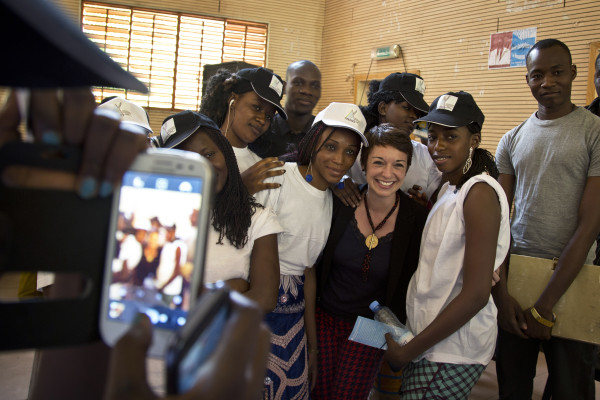Youth, Peace & Security
The Youth, Peace and Security (YPS) Agenda aims to promote the needs, perspectives and participation of young people in peace and security issues. Since its adoption, the role of young people has been given greater prominence. The YPS-Agenda is based on United Nations Security Council Resolution 2250 of 2015 and its two follow-up resolutions of 2018 (Resolution 2419) and 2020 (Resolution 2535). The YPS Agenda calls for a greater voice and meaningful participation in peace processes for young people between the ages of 18 and 29. The agenda encompasses five key concerns:
- First, young people should be involved in all decision-making processes, from conflict prevention to peace negotiations (participation).
- Second, the human rights of young people must be protected and all human rights violations against them must be prosecuted (protection).
- Third, young people should be supported through the prevention of violence and the promotion of a culture of tolerance and intercultural dialogue (prevention).
- Fourth, young people should be involved in the development of peace-building strategies, both during and after conflicts, with the help of the relevant UN institutions (partnerships).
- Finally, young people should be involved in the planning of disarmament, demobilization and reintegration programmes through employment and educational opportunities (disengagement and reintegration).
More and more international organizations are incorporating the YPS agenda in an institutional framework. In September 2022, the UN Youth Office was established and in October 2023, Dr. Felipe Paullier was appointed as the first Assistant Secretary-General for Youth Affairs. His mandate is to enhance the involvement of young people in the UN system and to increase their participation in the intergovernmental environment. Specifically, the second follow-up resolution (Resolution 2535) explicitly aims to further implement the agenda in the UN system. In this context, resources have been created in peace operations and tailor-made implementation strategies for the agenda have been developed. As a result, the YPS Agenda has found its way into the mandates of eight UN peacekeeping missions and eleven special political missions. Thus, it is taken into account for instance in programmes on security sector reform, rule of law, institutional capacity and governance.
Until its closure at the end of 2023, the mission in Mali (MINUSMA) appointed young "peace ambassadors" who worked to strengthen civil society and local governance. Through a youth forum, young people were also actively involved in security sector reform (SSR). The peacekeeping mission in South Sudan (UNMISS) established the first juvenile detention center together with the International Committee of the Red Cross providing a better environment for the reintegration of youth into society and thus preventing the (re)recruitment of young people into armed groups. Another example is the United Nations Interim Force in Lebanon (UNIFIL), which supports initiatives that focus on non-violent communication using music, art and theatre to bring together young people from different cultural, religious and ethnic backgrounds.
The programmatic activities of the following UN Peacekeeping Missions reflect the YPS Agenda:
- UNMISS in South Sudan
- UNFICYP in Cyprus
- MONUSCO in the Democratic Republic of the Congo
- UNMIK in Kosovo
- MINUSCA in the Central African Republic
- MINURSO in the Western Sahara
- UNIFIL in Lebanon
 © MINUSMA UN Photo/Marco Dormino
© MINUSMA UN Photo/Marco Dormino
Moreover, the YPS Agenda is gaining momentum in other international organizations. NATO, for example, organizes an annual Youth Summit to hear the voices of young people and their views on the security challenges facing the Alliance. In the European Union, the agenda has been part of the new EEAS Youth Action Plan since October 2022. The new Civilian CSDP Compact, adopted in May 2023 to strengthen the civilian component of the EU's Common Security and Defence Policy (CSDP), also directly references UN Resolution 2250. Another initiative is the African Union (AU) Youth Ambassadors for Peace Programme: five regional youth ambassadors with a two-year term of office are to advocate for the continued involvement of young Africans in peace and security and promote programmatic measures to strengthen their role.
The OSCE already mentioned the importance of youth in its founding document (Helsinki Final Act of 1975). In the last decade, the role of young people in peace and security issues has been further recognized in various declarations (Declaration on Youth and Security 2015, Declaration on the Role of Youth in Contributing to Peace and Security Efforts 2018). This is reflected in the various field missions: The Youth Advisory Group of the OSCE Mission to Bosnia and Herzegovina and the OSCE Presence in Albania offer young people the opportunity to contribute their perspectives to the activities of these field missions. The flagship project of the OSCE Presence in Albania is the Youth Trail, a one-week exchange for 30 young people from the Western Balkans to promote regional networking among young people and to promote peace and security in the region.
As of: 14.12.2023